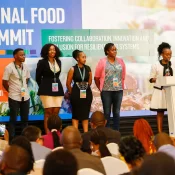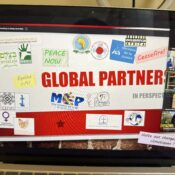
Sustainable and Inclusive Food-Systems Agents (SIFA) Suba Farmers Consultative Meeting
Agriculture plays a significant role in greenhouse gas emissions, making them contributors to climate change. However, if Agriculture is practised sustainably, it can aid in the sequestration of greenhouse gases, thereby directly contributing to the reduction of emissions. The impacts of climate change on communities’ livelihoods, including agriculture, are both direct and indirect. These impacts affect different groups of people in various ways, with marginalized communities shouldering a disproportionate burden.
Taking this into account, conducted a consultative meeting in partnership with the Lake Region Economic Network (LREN) https://lrenkenya.org/ on July 5th, 2023. The meeting specifically involved Suba Community Farmers, who are among the Indigenous Peoples in Kenya. The Suba People predominantly reside along the shores of Lake Victoria, primarily in Homabay County, with some also residing in Migori County. Both Homabay and Migori Counties fall within Kenya’s Arid and Semi-Arid Land (ASAL) regions, where communities have faced severe marginalization.
Traditionally reliant on fishing for their livelihoods, the Suba People have had to diversify into crop farming due to dwindling fish populations in the lake, largely attributed to climate change and other factors. The meeting aimed to include a diverse representation of farmers based on sex, age, and disability. The farmers have predominantly adopted irrigation farming methods, with support from LREN. Additionally, male and female youth, whose tertiary education is sponsored by LREN, participated in the meeting in order to introduce them to the discourse on food systems and climate change, empowering them as agents of change. The objective was also to familiarize them with agriculture, specifically crop farming, as an alternative source of livelihood and economic empowerment.
During the meeting, participants shared their experiences with crop farming and how it has improved their livelihoods. They emphasized the importance of diversifying into livestock and poultry farming for further economic empowerment. The older participants encouraged the youth to embrace farming as a viable means of livelihood and economic independence. The farmers highlighted several challenges, including a lack of market access, limited accessibility to seeds especially among the youth, and crop destruction by hippopotamuses which roam the farms and feed on crops. To mitigate the destruction by hippopotamus, some women have opted to cultivate millet instead of maize or vegetables, as hippopotamuses have difficulty consuming millet. After the forum, we paid a visit to the farms to observe the activities in which the farmers were involved.
We anticipate holding additional consultative meetings and collaborating with food systems stakeholders to implement the concerns identified through these fora.



